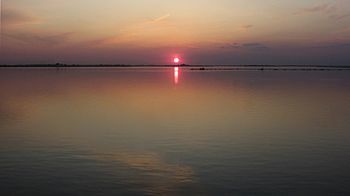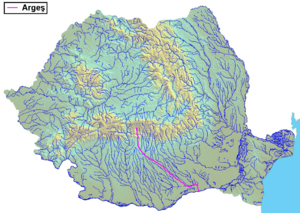Argeș (river) facts for kids
Quick facts for kids Argeș |
|
|---|---|

The Argeș in Mihăilești-Cornetu
|
|

The Argeș in Romania
|
|
| Country | Romania |
| Counties | Argeș, Dâmbovița, Ilfov, Giurgiu, Călărași |
| Cities | Curtea de Argeș, Pitești, Oltenița |
| Physical characteristics | |
| Main source | Făgăraș Mountains Arefu 2,030 m (6,660 ft) 45°36′04″N 24°37′30″E / 45.601°N 24.625°E |
| River mouth | Danube Oltenița 11 m (36 ft) 44°3′33″N 26°37′1″E / 44.05917°N 26.61694°E |
| Length | 350 km (220 mi) |
| Basin features | |
| Progression | Danube→ Black Sea |
| Basin size | 12,550 km2 (4,850 sq mi) |
| Tributaries |
|
The Argeș (Romanian pronunciation: [ˈardʒeʃ]) is an important river in Southern Romania. It flows into the Danube river, which is one of Europe's longest rivers. The Argeș is about 350 kilometers (217 miles) long. Its basin area, which is the land that drains water into the river, covers about 12,550 square kilometers (4,846 square miles).
The river starts high up in the Făgăraș Mountains. These mountains are part of the Southern Carpathians. The Argeș then flows southeast until it joins the Danube near the city of Oltenița. On average, about 71 cubic meters (2,500 cubic feet) of water flow from the Argeș into the Danube every second.
The biggest city located along the Argeș River is Pitești. Higher up the river, there's a large structure called the Vidraru Dam. This dam creates a big artificial lake known as Lake Vidraru. The very top part of the river, before it reaches Lake Vidraru, is also called Capra.
Contents
River's Name and History
What Does Argeș Mean?
Historians believe the Argeș River might be the same river that an ancient Greek historian named Herodotus called Ὀρδησσός (Ordessus). The exact meaning of the name "Argeș" isn't fully clear.
Some people think the name comes from the ancient name, possibly through a word like *Argessis. There was also an ancient city called Argedava, which was the capital of a Dacian leader named Burebista. However, it seems this city's name is not connected to the river's name.
Another Idea for the Name
Another idea is that the name "Argeș" comes from a Pecheneg word. The Pechenegs were a group of people who lived in the area long ago. Their word argiș meant "higher ground."
The city of Curtea de Argeș means "The Court on the Argeș." Early records of this city's name, like Argyas (from 1369), Argies (from 1379), and Arghiș (from 1427), suggest that the river might have been named after the city.
Towns Along the Argeș River
Many towns and villages are located along the Argeș River, from its source in the mountains all the way to where it meets the Danube. These places include:
- Căpățânenii Ungureni
- Căpățânenii Pământeni
- Arefu
- Poienarii de Argeș
- Corbeni
- Rotunda
- Albeștii de Argeș
- Curtea de Argeș
- Băiculești
- Merișani
- Bascov
- Pitești
- Găești
- Bolintin-Deal
- Adunații-Copăceni
- Oltenița
Using the River for Energy
Hydroelectric Power
The Argeș River and some of its smaller rivers (tributaries) are used to create hydro energy. This is a way to make electricity using the power of flowing water.
The system that generates this energy includes:
- Dams: These are large barriers built across the river to hold back water.
- Lakes: The dams create artificial lakes, also called reservoirs.
- Tunnels: Water flows through tunnels to reach power plants.
- Power Plants: These facilities use the force of the water to spin turbines and generate electricity.
Lakes on the Argeș
Several lakes have been built on the Argeș River itself. These include:
- Vidraru
- Oiești
- Cerbureni
- Curtea de Argeș
- Zigoneni
- Merișani
- Budeasa
- Bascov
- Pitești
- Călinești (also known as Golești)
- Zăvoiu (near Mătăsaru)
- Ogrezeni
- Mihăilești
Dams and lakes are also built on the smaller rivers that flow into the Argeș.
Rivers Joining the Argeș
Many smaller rivers flow into the Argeș River. These are called tributaries. They are listed below, from the source of the Argeș to its mouth:
Left Tributaries
These rivers join the Argeș from its left side (if you are looking downstream):
- Braia
- Mândra
- Buda
- Valea cu Pești
- Valea Lupului
- Berindești
- Valea Iașului
- Sasu
- Vâlsan
- Râul Doamnei
- Vrănești
- Râncăciov
- Cârcinov
- Budișteanca
- Sabar
- Dâmbovița
- Rasa
- Luica
Right Tributaries
These rivers join the Argeș from its right side (if you are looking downstream):
- Paltinul
- Lespezi
- Modrugaz
- Cumpăna
- Valea lui Stan
- Arefu
- Bănești (Cicănești)
- Valea Danului
- Tutana
- Schiau
- Bascov
- Neajlov
See also
 In Spanish: Río Argeș para niños
In Spanish: Río Argeș para niños
- List of longest rivers of Romania
- Battle of the Argeș
 | James Van Der Zee |
 | Alma Thomas |
 | Ellis Wilson |
 | Margaret Taylor-Burroughs |

